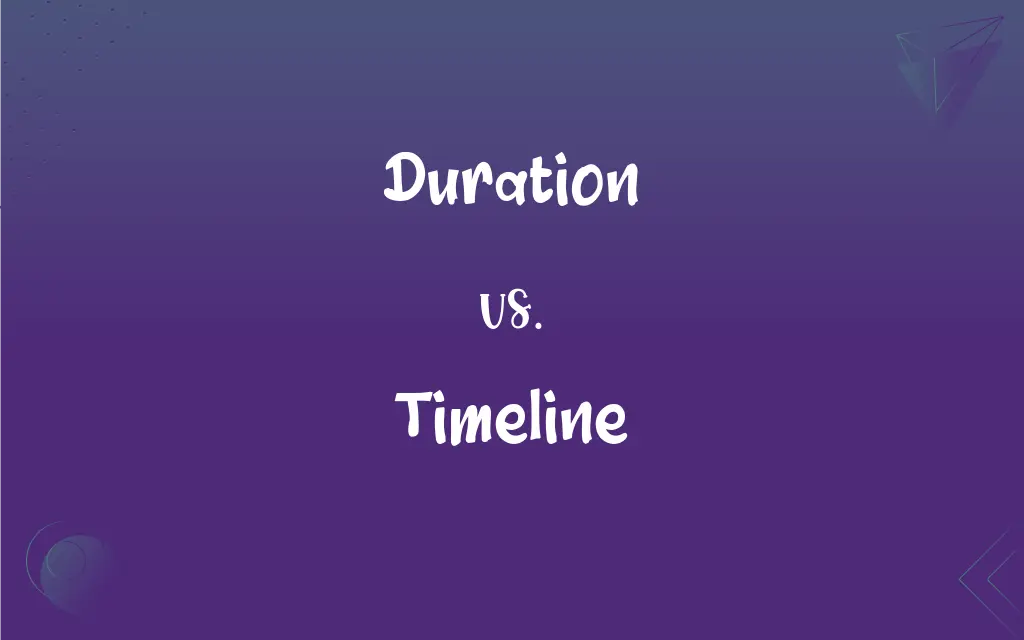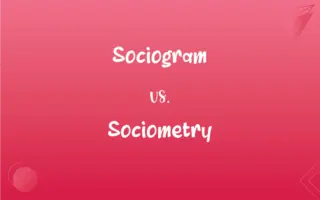Duration vs. Timeline: What's the Difference?
Edited by Janet White || By Harlon Moss || Updated on November 29, 2023
Duration refers to the length of time something lasts, while a timeline is a graphical representation of events in chronological order.

Key Differences
Duration is the length of time that something continues or exists, often measured in units like seconds, minutes, hours, or years. Timeline, in contrast, is a visual or graphical representation of events in chronological order, showing how they unfold over time.
Duration is a measure of the temporal extent of an event or activity, focusing on how long it lasts. Timeline provides a chronological sequence of events or activities, highlighting the order and timing of occurrences.
Duration is a concept used to quantify the length of an experience, process, or condition. A timeline is a tool for organizing and presenting information about events, typically in a linear format.
Duration is often used in contexts where the emphasis is on the length of time something takes, such as a task or an experience. Timeline is commonly used in historical, project management, or planning contexts to depict the sequence and duration of various events.
Duration is a more abstract concept, primarily focused on measurement and perception of time. Timeline, however, is a more concrete representation, often laid out graphically to provide a clear view of events over a period.
ADVERTISEMENT
Comparison Chart
Definition
Length of time something lasts
Graphical representation of events in order
Focus
Quantifying time span
Chronological order of events
Usage
Measuring and describing how long something lasts
Organizing and presenting events sequentially
Representation
Abstract, numerical
Visual, often linear
Common Contexts
Time management, experiences, tasks
History, project planning, storytelling
ADVERTISEMENT
Units of Measure
Seconds, minutes, hours, years
Dates, years, eras
Emphasis
Temporal extent
Sequence and timing of events
Application
Often used in everyday conversation
Used in more formal or structured settings
Visual Component
None
Integral, often presented graphically
Temporal Relation
Concerned with the length of a single span
Shows relationships between multiple spans
Duration and Timeline Definitions
Duration
A specific period of time.
The contract specifies a duration of three years.
Timeline
A tool used in project management to visualize the phase and duration of tasks.
The team reviewed the project timeline to assess progress.
Duration
The time during which something continues.
The duration of the movie was two hours.
Timeline
A graphical representation of the sequence of events in chronological order.
The project's timeline showed key milestones.
Duration
The length of time that something exists or lasts.
He was surprised by the short duration of the flight.
Timeline
A schedule or plan that indicates the times at which certain events are intended to occur.
The construction project had a strict timeline for completion.
Duration
The continued existence or persistence of something over time.
The duration of her performance captivated the audience.
Timeline
A line that shows important events in the order in which they happened.
The history teacher illustrated the war's events with a timeline.
Duration
A measure of the time span of an event or condition.
The medication's effects vary in duration.
Timeline
A chronological order of events in the history of a subject.
The book included a timeline of scientific discoveries.
Duration
Continuance or persistence in time.
Timeline
A schedule of activities or events; a timetable.
Duration
A period of existence or persistence
Sat quietly through the duration of the speech.
Timeline
A chronology.
Timeline
A representation or exhibit of key events within a particular historical period, often consisting of illustrative visual material accompanied by written commentary, arranged chronologically.
Timeline
A graphical representation of a chronological sequence of events (past or future); a chronology.
Timeline
A schedule of activities; a timetable.
Timeline
(scifi) An individual universe or reality, especially a parallel/alternate one in which events differ from actual history, or differ from the established canon of a fictional world.
Timeline
To analyse a sequence of events or activities.
Timeline
To display such a sequence graphically.
FAQs
Is duration always a precise measurement?
Duration is often precise but can also be approximate, depending on context.
Can a timeline include future events?
Yes, timelines can include both past events and planned future events.
Is duration used in everyday language?
Yes, duration is commonly used in everyday conversations to discuss time spans.
Does duration relate to the quality of time?
Duration primarily measures the quantity of time, not the quality.
Are timelines only used in historical contexts?
No, timelines are used in various contexts, including project management, education, and storytelling.
Can duration be subjective?
Yes, the perception of duration can be subjective, especially in personal experiences.
Can duration apply to abstract concepts?
Yes, duration can apply to both concrete events and abstract concepts like feelings or states.
Can duration be indefinite?
Duration can be indefinite in some contexts, such as describing ongoing conditions.
Are timelines used in storytelling?
Yes, timelines are used in storytelling to organize and present events chronologically.
Is a timeline a planning tool?
Yes, timelines are often used as planning tools to outline the sequence of events or tasks.
Can timelines show simultaneous events?
Yes, timelines can show events that occur simultaneously, often using parallel lines or markers.
Is duration always linked to specific start and end points?
Duration typically involves specific start and end points but can also refer to ongoing states.
Does duration have a standard unit of measurement?
Duration is typically measured in standard units like seconds, minutes, hours, days, etc.
Are timelines useful in business?
Yes, timelines are crucial in business for project timelines, planning, and historical analysis.
Can duration be estimated?
Yes, duration can be estimated when exact measurements are not available.
Do timelines require chronological order?
Yes, the defining feature of a timeline is its chronological order of events.
Do timelines require a visual format?
Timelines are typically visual but can also be described in text or other formats.
Is duration relevant in physics?
Yes, duration is an important concept in physics, particularly in measuring time intervals.
Do timelines aid in understanding historical events?
Yes, timelines help in understanding the sequence and context of historical events.
Can timelines be interactive?
Yes, especially in digital formats, timelines can be interactive, allowing users to explore details.
About Author
Written by
Harlon MossHarlon is a seasoned quality moderator and accomplished content writer for Difference Wiki. An alumnus of the prestigious University of California, he earned his degree in Computer Science. Leveraging his academic background, Harlon brings a meticulous and informed perspective to his work, ensuring content accuracy and excellence.
Edited by
Janet WhiteJanet White has been an esteemed writer and blogger for Difference Wiki. Holding a Master's degree in Science and Medical Journalism from the prestigious Boston University, she has consistently demonstrated her expertise and passion for her field. When she's not immersed in her work, Janet relishes her time exercising, delving into a good book, and cherishing moments with friends and family.































































